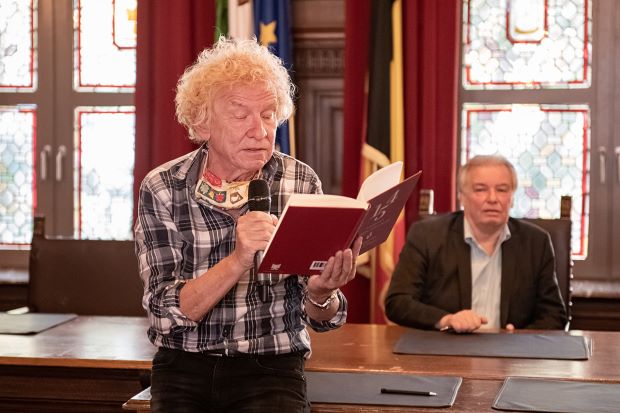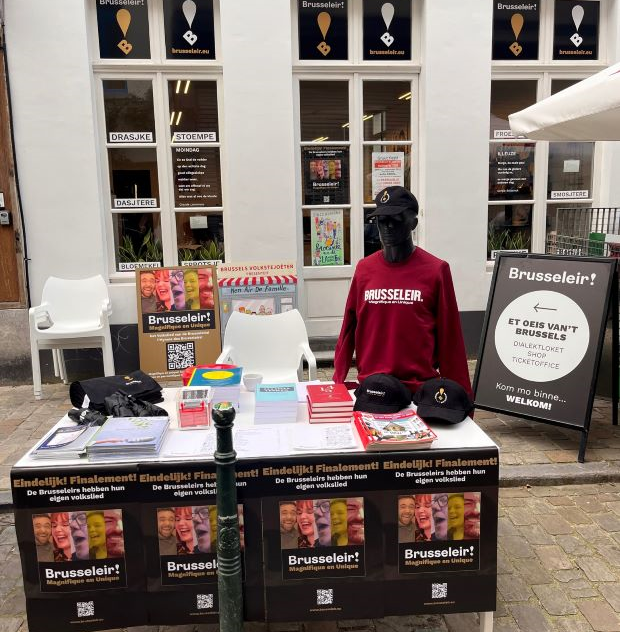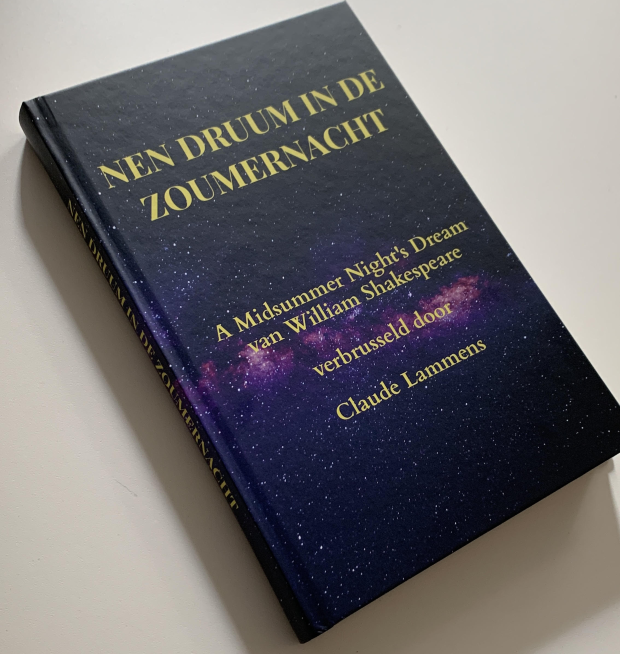- Daily & Weekly newsletters
- Buy & download The Bulletin
- Comment on our articles
How the Brusseleir dialect is alive and kicking, with a little help from Shakespeare
The Royal Shakespeare Society in Birmingham will soon be receiving an unusual gift, a hand-delivered manuscript by Belgian poetry translator and dramaturg Claude Lammens.
The original present is just one example of Lammens’ labour of love to perpetuate the Brusseleir dialect beyond the Belgian capital, where it continues to be spoken and performed.
This is despite a widespread campaign in the postwar years to quash Belgium’s many local dialects, north and south of the country.
“In the 1960s, the VRT [Flemish public broadcasting company] broadcast the TV programme ‘Hier spreekt men Nederlands’ in order to impose standard Dutch and to ban dialects from the face of the earth,” explains Lammens (pictured below).

We’re chatting – in English – in the centre of Brussels, not far from the birthplace of the Brusseleir dialect in the popular Marolles district. “Dialects were considered vulgar and not the done thing. It would be a bit like the BBC promoting ‘Stiff upper lip English’ as a standard, banning Cockney and other dialects,” he says.
It turns out that there are two dialects, albeit very similar, the Flemish-based Brusseleir and the French-based Bruxellois. The latter is a “poor translation into French of the authentic Flemish-based Brusseleir language,” according to Lammens.
Bruxellois emerged in the early 19th century when Belgium was occupied by Napoleon Bonaparte and the population realised that speaking French would help them find jobs and move up the social ladder. The francophone version of the ancient language is often a direct transposition of Brusseleir into Bruxellois.
Lammens argues that Brusseleir is a language rather than a dialect: “A language has to be alive – integrating new words and expressions as they emerge from daily life – and have its own grammar, vocabulary and idioms that are not in other languages. And Brusseleir ticks all those boxes.”

Lammens invites me to the headquarters of the Brusseleir! association in Rue de Flandres/Vlaamsesteenweg (pictured), where we’re greeted by general manager Geert Dehaes. They start talking in Brusseleir and I can barely understand a word, partly because my Flemish is very limited. At a certain point, I hear the word ‘merge’ (morning) and make the connection with the German word ‘morgen’. And, bingo, I’m right!
Like many expats all too familiar with the weather in Brussels, I know the word ‘la drache’ (Bruxellois), a literal transposition of ‘drasj’ (Brusseleir). But Dehaes decides to test me further “Een drasjke kaffei?” he asks with a smile. “Yes, please,” I respond, recognising that this must mean ‘a spot of coffee’. My two new Brusseleir teachers nod. Literally, it means ‘a little rain of coffee’, which I’d recommend using if you want cafe owners in the Marolles to warm to you.
They chat on in Brusseleir, telling a few zwans type jokes. A zwanzer is a joker or prankster from Brussels, with the zwans being a local joke that’s often bawdy and comes with a hint of irony and possibly self-mockery. The ‘drasj national’ (Brusseleir) or ‘drache nationale’ (Bruxellois), which locals say when it rains on Belgium’s national day on 21 July, is a zwans!
The forerunner of the Brusseleir! association was the Academy of the Brussels Dialect, founded in the 1980s by Sera de Vriendt and Jef De Keyser. It was the latter who contacted Lammens in the mid-1990s to set up a theatre company performing in the Brussels dialect.
Brussels Volkstejoêter was born in 2000. Alongside Brusseleir language evening classes and a Brusseleir week of events in November and December, it forms a key pillar of the association’s activities.

And that brings us back to the Shakespeare connection. As Lammens explains, both Brusseleir and Shakespeare’s English are spiced with coarse, brutal, vulgar language that is sometimes ambiguous in a sexist way. “Both languages come from the belly,” he says, adding that, in many ways, Shakespeare was rather like a ‘Ketje’ (a real Brussels local).
His gift to the Royal Shakespeare Society is a translation into Brusseleir of A Midsummer Night’s Dream (pictured above), which will be performed in Brusseleir in the Belgian capital in 2025. Lammens’s translation of the Shakespeare comedy will be presented on 6 December. Other upcoming events include De Week van et Brussels in November/December.
Fun facts about Brusseleir
- It is spoken by the famous cyclist and multiple Tour de France winner Eddy Merckx
- It emerged, along with other dialects, such as Leuven, Ghent and Antwerp, from the former Duchy of Brabant, a state of the Holy Roman Empire (1100s to the 1600s)
- Puppet shows in Brusseleir are performed at the Theatre Toone near the Grand Place
- The Marolles cafe De Skieven Architek (the wonky architect) is a mistranslation of the English ‘chief architect’, a reference to Palais de Justice architect Joseph Poelaert
Brusseleir! has published the Brusseleir-French dictionary Le dialecte Bruxellois, amusingly described as a new version of ‘Keskeseksa’ (Wat es ma da na?!), which includes a description of its phonetics and grammar.
Example of Bruxellois, or ‘badly translated Brusseleir’
Brusseleir: Zet aa
Bruxellois: Mettez-vous
Correct French: Asseyez-vous
English: Be seated or sit down
Photos: (main image) Claude Lammens (right) and Geert Dehaes performing 'The Taming of the Shrew' in Brusseleir; Lammens reading Shakespeare Sonnets translated into Hasselt dialect; Translation of A Midsummer Night’s Dream by Lammens




















Comments
Claude also translated 154 of Shakespeare's sonnets into Brussels dialect.
A masterpiece!